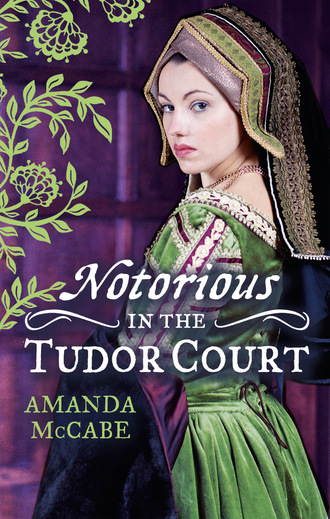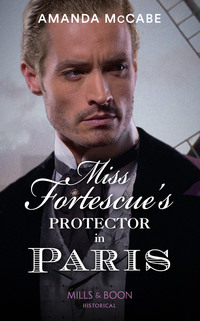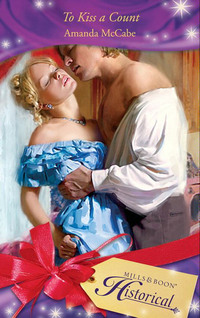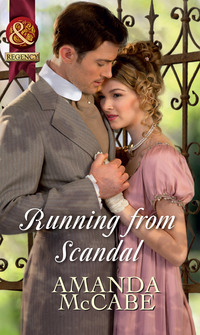
Полная версия
NOTORIOUS in the Tudor Court
“Pearl or not, girls need their rest,” Queen Katherine said placidly. She took her daughter’s hand as Henry lowered Mary to her feet. “I will take the princess to her apartment.”
With the queen and her ladies gone from the hall, the music changed. From the slow, traditional pavane, the tempo increased to a lively saltarello, the newest dance to arrive from Italy. Marguerite watched closely as King Henry led a new lady on to the floor, and the other couples edged to the sides of the pattern to make room for them.
This, then, must be the famous Anne Boleyn, Marguerite thought. Lady Penelope Percy had been right, Mistress Boleyn was not beautiful. She was small and very thin, her complexion too sallow to ever aspire to the fashionable roses-and-lilies. Her hair was almost as black as the night sky outside, thick and straight, glossy, held back from her pointed face by a jewelled band. Her dark eyes flashed with a bright, naughty wit as she smiled up at the king.
But Marguerite saw that she possessed something deeper, more valuable than mere prettiness. She had style, and a light, lithe grace. She had self-possession and confidence. She looked at the gathering as if she owned it, as if they were all—Henry especially—hers to command. And the king in turn stared at her as if he would be commanded in an instant by anything she said.
Non, Anne Boleyn was not someone Marguerite would care to tangle with. She would just have to take care to steer clear of her. If such a thing was possible.
“That must be the English king’s new harlot,” Marguerite heard a low, hard voice murmur. She glanced up to see that the Duke de Bernaldez had moved to sit beside his wife, and Father Pierre had taken his place. The priest watched the dance with burning, disapproving eyes.
“I would not let King Henry hear you say such things,” Marguerite warned. “You could find yourself sent back to Paris in a trice.” Which might not be such a bad thing, Marguerite reflected, except for the bad light it would cast on the whole French party.
“And why is that? She will surely be gone soon enough, just like Elizabeth Blount and Mistress Shelton.”
Marguerite reached for her goblet, sipping at the wine left in its gilded depths. “What do you know of them?”
“I know they are not at Court, even though Mistress Blount gave the king a son. They have no place here once the king tires of them. They were sent away, an embarrassment, and Mistress Boleyn will be, too. Just as her sister was before her.” Father Pierre’s voice was filled with low, bitter spite.
Marguerite watched the dancing. Mistress Boleyn was very deft; she leaped and ran, snapped her fingers, twirled in a graceful snap of her sky-blue silk skirts. And Henry stared, enraptured, his hands reaching for her as a praying supplicant would touch the Virgin’s robe. “I am not so sure of that.”
“Why, these English dances are only trotting and running,” Don Carlos said, laughing. “Not at all graceful. We should show them what true dancing looks like, querida.”
Marguerite looked back to see Dona Elena hide her own laughter behind her fan. “My dancing days are long done, I fear.”
Her husband smiled ruefully. “As are mine.” He pressed his hand to his wife’s arm, a couple obviously united in deepest contentment.
Marguerite’s heart gave a sour pang, and she longed to turn away from the whole room. All these damnably loving couples. Dona Elena stopped her with a word. “I am sure Señorita Dumas’s dancing days are in their prime!”
“Oh, no, Dona Elena,” she protested. “I do not care to dance tonight, and my skills in the saltarello are nothing to Mistress Boleyn’s.” Beside her, she felt Father Pierre’s stare burning on her skin.
Dona Elena would not hear it, though. “Nonsense! They say you French ladies are the finest of all dancers, that you begin to learn as soon as you can walk.” She waved her hand, calling, “Nicolai! Come here a moment, I need you.”
The duke laughed, giving Marguerite a complicit shrug. “My wife, you see, will not be turned when she gets a thought into her head. If she wants to see you dance, mademoiselle, you will surely dance.”
Marguerite had to laugh. Was that not what she always did? Dance when commanded? First for her father, then King François. Why not for Dona Elena?
But did it have to be with Nicolai? She watched warily as he drew nearer, the abandoned Spanish girl taking his departure with a pretty little pout. He went down on one knee next to Dona Elena, smiling up at her. Marguerite saw, though, that he was also cautious, his blue eyes shadowed.
“I am at your command, as ever, Dona Elena,” he said gallantly. “What is your desire? Shall I fetch oranges from Madrid? Cinnamon from the Indies? Pearls from the depths of the seas?”
Dona Elena laughed merrily, patting his cheek with her soft hand. “Perhaps later! For now, I have a far simpler task, one I think you will enjoy.”
“Merely name it, my duchess, and it is yours.”
“You must partner Señorita Dumas in the next dance. I want to see her dance, and there is no more skilled a partner than you.”
Marguerite remembered Nicolai on his tightrope, the light, effortless movements of his bare feet, the powerful contraction of his lean body as he leaped in a backwards arc. Oui, he would be a skilled dancer indeed. She shivered as she imagined his steps guiding hers, his touch on her body. The friction and caress as he lifted her. Could she trust him?
Could she trust herself?
Nicolai glanced at her from the corner of his eye, as unreadable as a cat. “It would be my pleasure to dance with Mademoiselle Dumas, if she will have me as a partner,” he said.
Dona Elena smiled with obvious satisfaction, like a soft, devious kitten who had just filched a dish of cream. That was what the entire Spanish contingent was like, then—a pack of cats, sly, changeable, beautiful, untrustworthy.
As Nicolai came around the long table, Father Pierre suddenly seized her arm in a hard grasp. Marguerite stared at him, startled. He was so silent she had almost forgotten he was there, lurking beside her.
“You should not be so involved with these people, mademoiselle,” he hissed. “They are not what they seem!”
Marguerite tried to laugh lightly, tried to extract her arm from his dry, fevered touch. What had possessed him? True, she did not care at all for his intent stares, but he had never grabbed her before. “La, Father Pierre, I am only dancing with the man! I am not running away to Madrid with him.”
Though, at that moment, fleeing this place, all these people with their hidden agendas, for the sunny dustiness of faraway Spain was tempting. She wrenched her arm away just as Nicolai reached her side, and gratefully accepted his hand. He led her to the edge of the floor, where they waited for the saltarello to end. The king and Anne Boleyn were lost to sight now amid a press of dancers, a shifting constellation of bright silks and flashing feet. The thunder of stamping and clapping.
“Who is that skeletal young man?” Nicolai asked.
Marguerite glanced back at Father Pierre, who still watched her, and shivered. He did look rather skeletal, like a figure in an old memento mori painting, death come to the banquet. Pale and solemn, an ever-present reminder of duty and fate.
As if she needed him to remind her she was damned! She knew it every moment.
“Father Pierre LeBeque,” she answered. “He is one of Bishop Grammont’s attendants.”
“He seemed most reluctant to let you go, though I can scarcely blame him.”
“I do not know what he wants,” she said impatiently. She turned resolutely away from the priest, fiddling with a ribbon at her sleeve. She had to keep her fingers busy, to prevent them from reaching instinctively for the beckoning golden flame of Nicolai’s hair. It rippled down his back like a smooth, bright banner, warm as the summer sun after a long winter.
But his eyes were so, so cool.
“I am sorry Dona Elena importuned you,” she said. “I told her I did not care to dance tonight.”
Nicolai shrugged. “As the duke said, once she has a thought in her head you will never get it out again. Besides, it is no great hardship to dance with the most beautiful lady at the banquet.”
Marguerite laughed, ridiculously pleased at the gallant, empty compliment. “More beautiful than your Spanish companion? She seemed so very fascinated by all you had to say.”
“You noticed that, did you? How very observant you are, mademoiselle.”
“I like to know all things about all people.”
“An ambitious goal indeed. And yes, Señorita Alva is quite pretty.”
“Dona Elena told me how convinced she is that a fine wife and home would surely add greatly to your happiness, Monsieur Ostrovsky.”
Nicolai gave a startled laugh. “She confides in you already, does she? You do have a gift for drawing people in.”
“We took a stroll by the river this afternoon. I think that Dona Elena would not be a difficult person to ‘draw in’ by anyone. She seems a very sweet-natured lady, so open and artless. Perhaps it was the convent that made her so?”
“Ah, Mademoiselle Dumas, and here I thought you knew better. The people who appear the most artless are usually the most dangerous of all.”
The music ended and the floor cleared, sets forming for the next dance. Once again, King Henry and Mistress Boleyn were at the head. Nicolai led Marguerite to their places at the end of the line.
But she had to ask one more thing before the steps of the dance parted them. “Will you marry your Señorita Alva, then?”
Nicolai laughed. “Mademoiselle Dumas, marriage is not for such people as you and me. Another lesson I thought you had learned.”
The music began, and he blew her a kiss from his fingertips. Marguerite could vow she felt it land softly on her cheek, where he had kissed her earlier.
The dance was a passamezzo, a livelier version of the pavane and much less dignified. Henry and Anne clasped hands and twirled down the line, all the other couples peeling off after them. Marguerite’s hand reached out for Nicolai’s, and they, too, spun away.
The steps were quick—as the duke said, prancing and trotting. Marguerite hopped and swirled around Nicolai, until his hands caught her about the waist and lifted her from the floor, spinning her around and around. The crowd shifted and blurred, a humid, wild tangle, like a dream. Marguerite laughed helplessly, leaning her hands on his strong shoulders as he lifted her higher and ever higher. Surely, with his touch she could fly!
It was even better than running away to Madrid. This was leaving the ugly, deceptive earth altogether, free of everything but his touch, which kept her safe.
At last he lowered her back to the floor, grounding her, yet she still felt as light as the earth itself.
Yes, he was a fine dancer, just as she suspected he would be. He turned and moved her so easily, she was hardly aware she moved at all. The banquet hall, the other dancers, even all that awaited her when the music ended, disappeared.
The music built and built, faster and faster, the lines growing tighter and closer until at last the great finale arrived. Nicolai lifted her again, spinning her until she gasped dizzily, laughing in sheer delight. She stared down at him, at his smile, his glowing face. Had she thought his eyes cool? Nay, they burned with the light of a dozen suns, and she basked in their heat.
The song ended in a crash, and Nicolai lowered her for the last time, slowly, slowly, their bodies in a delicious friction of satin on velvet, flesh on flesh. In the rush of the crowd, Marguerite pressed her forehead to Nicolai’s shoulder, inhaling the heated scent of him, her breath tight in her throat.
She had the fearful sense that, if she let go of him, she would fall.
His hands held on to her arms, strong and solid, warm through the thin silk of her sleeves. She felt the rise of his chest as he breathed, and her own breath moved in unison with his. For this one, ephemeral moment, she sensed what it was to have something to cling to when the cold winds of the world howled.
But then the moment was gone. Nicolai stepped back, and the winds swept around her again. Marguerite threw her shoulders back, held her head high, resisting the urge to wrap her arms tightly around herself against that icy hollow in her belly.
Nicolai did not smile, did not even really look at her, gazing somewhere above her head. “Shall I take you back to your seat, mademoiselle?” he asked tightly.
Marguerite shook her head. She couldn’t face Father Pierre just yet, nor even Dona Elena with her sweet smiles. “I cannot breathe in here,” she murmured. “I think I shall walk outside for a moment.”
“Let me go with you.”
She shook her head again. He was part of her confusion, the very worst part! When he was near she could not think clearly. She could not be the Emerald Lily, cold, merciless. “You should return to Señorita Alva.”
Nicolai laughed. “In truth, Mademoiselle Dumas, I cannot catch my breath in here, either. There are far too many people, too many wine fumes. And I would not like to encourage Dona Elena where any of her ladies are concerned. Please, at least let me see you safely to your lodgings.”
Marguerite longed to protest, to run away, but she feared her legs would not carry her. She felt lightheaded, and so very sad. She nodded, and he took her hand in his and led her through the milling, laughing crowds. The press of people, the roil of their drunken chatter, King Henry’s loud bellow—it was all too much. It was her world, the one she had fought so hard to belong to, make a place in, but tonight she couldn’t bear it.
What was wrong with her? Surely she just needed fresh air. Needed to clear her muddled head and regain her sense of purpose.
Maybe the only way to do that was by pushing Nicolai Ostrovsky into the Thames!
As they emerged from the banquet hall into the chilly night, Marguerite chuckled at the image of Nicolai cartwheeling into the river. Vanishing under the waves, leaving her to be as she was before, whole and cold and untouchable. The only trouble was, he might very well drag her in with him.
“And what makes you laugh so, mademoiselle?” he asked, as they turned down one of the pathways, shining white in the starlight. They ducked behind a concealing hedge, away from curious eyes.
Marguerite shook her head. “Merely a jest of my own.”
“I am glad to see you catch your breath enough to make jests.”
She drew in a deep breath of the cold, smoketinged air. She was surprised to find that she had caught her breath, that her lungs were expanding, opening up so she could smell everything. The clear breeze, the chimney smoke, the frosty river, the flowers slumbering under the ground. The stones and grass and wine. Nicolai’s scent, his hair and wrist and neck.
Her world tonight kept expanding and retracting in ways she could never have imagined. She remembered what it was to fly free in the dance, and now she twirled in a circle, her head tipped back to take in the night sky. The endless expanse of stars. She imagined herself soaring up into the endless blackness, free.
What had got into her tonight? The wine, the music? She could not fathom it. She could only twirl faster, her arms outstretched to take it all in.
The world would retract again soon enough, pull back inside to that one pinpoint that was her life—to deceive and defeat.
Nicolai laughed, catching her hands in his as she twirled. He tried to still her, but she would not let him. Instead, she pulled him into her circle, and they whirled and whirled until the sky and the palace and England itself were nothing but a buttery blur.
“Who is this mad creature?” he cried. Just like in the dance, he caught her around her waist, lifting her up and up until she flew into the sky. She lifted her hands as if she could grasp the very stars and pull them down to put into his beautiful hair.
“What has possessed you, Marguerite?” he said. “My wild rusalka.”
“I am possessed,” she gasped. She buried her fingers in his hair, the warm strands slipping silkily from her grasp. “Come, Nicolai, be mad with me. We shall have to be sane again soon enough.”
“I fear one of us will have to be sane right now,” he said, lowering her to her feet. “Or trouble such as we have never known in our very troublesome lives will descend on us.”
“Non, non,” she said, still caught deep in the moon’s spell. “Kiss me, Nicolai.”
“Marguerite…”
She grasped his hair again, and drew him toward her. Their lips met, and there was no practice to it, no artifice. Just a hot, blurry melding of their mouths, their passionate needs, so long denied.
She remembered Venice, how for one fateful moment she lost herself in him there. Just as then, she fell into him, into that bright essence of him, drowning, overwhelmed. She could not pull away, could not reach for her dagger. She threw herself heedlessly into him, deeply, madly. She held onto him as if she would never, ever let him go. She was his captive, but he would be hers, too.
He tried to draw away, to resist her. She could feel it in the tension of his shoulders, the supple arc of his back. She refused to let go, though, and he surrendered with a groan, falling into her as she did him. His arms closed around her, drawing her close against him, so close she could feel every inch of his body, every lean muscle and sharp curve, the heavy press of his penis through her skirts.
His lips dragged from hers, tracing fiery kisses to her jaw, her throat, the tiny fluttering pulse where her blood burned so hot just above her diamond. The plump curve of her heartbeat, concealed by her bodice.
How she wanted him! Every bit of him, his beautiful acrobat’s body, his laughter, his strength, his sex and, yes, his kindness, too. All that tenderness he showed Dona Elena and her son, she wanted it for herself. The terrible, desperate sense that it could never be hers, that it—he—was too good for her made her all the more desperate on this strange night.
She buried her fingers in his hair, pressing him closer to her heartbeat, the very life of her. “Mon ange, mon beau ange,” she whispered. And she meant it. Only an angel, or the worst sort of demon, could make her forget everything as he did.
He went still, perfectly still, his lips to her breast, and just like that she felt his soul fly away from her. It was as if her voice broke their spell. She clung to him, as he did her, his arms around her waist, his lips moving to the curve of her neck, their breath mingling. They were nearly as close as a man and woman could be, yet he was gone from her.
“Will you kill me now, Emerald Lily?” he said roughly. He slid his clasp to her hand, drawing her arm straight as he peeled back her sleeve to reveal the small blade strapped to her forearm. She had forgotten it was there, forgotten all but his kiss.
Now, as she stared down at the polished steel, she felt everything again. The cold night, the hollowness at her centre. She heard the distant thunder of revelry from the banquet house, and remembered where she was.
She pulled her arm away, shaking the sleeve into place. “If I had wanted to kill you tonight, you would have been dead long ago.”
“So, why am I not? What is it you want?” His Slavic accent, usually so faint, so lightly musical, was hoarser, rougher. He stepped back from her, wiping his lips with the back of his hand as if to erase the very taste of her.
Marguerite turned away, wrapping her arms tightly around herself. Her madness leached away, leaving her feeling brittle, angry. But angry at who, what? Nicolai—or herself?
She forced herself to laugh mockingly. “La, monsieur, I only desired a kiss! A kiss from a handsome man—is it so much to ask? So odd to you that it must be madness?”
He stood there in silence, just watching her as if to say he knew her too well now to believe that. To believe that her only motive could be a stolen kiss in the moonlight.
How infuriating he was, with those knowing eyes! How she wanted to kill him—or to weep.
But she would never give in to tears, especially not here and now. “I am sorry, monsieur, if I offended your modesty,” she said teasingly. “I assure you it won’t happen again. Now, shall we go back inside? I have an invitation to join Dona Elena for cards later.”
He gave her a low bow, his hand flourishing in a gallant, theatrical gesture toward the palace. “By all means, mademoiselle, let us go play games—of cards.” His voice lowered to a rough whisper, just loud enough for her to hear as she brushed past him, “But you know well this is not over.”
Ah, yes, she knew that all too well. This, whatever it was, would not be over until one of them was dead.
Chapter Nine
The scene in the Duke and Duchess de Bernaldez’s apartment was very different from that of the grand banquet hall. Indeed, it could almost have been taking place in an entirely different palace, Nicolai thought.
He gazed around the room as he strummed lightly at his lute, taking in all the people. The players in this little pageant. It was mostly the Spanish party, friends of the duke, the lilt of their Castilian accents soft above the music, the flicker of gilt-edged cards, the clink of golden goblets. Their laughter was gentle and muted, unlike the raucous banquet, the colours of their rich clothes subdued, glowing like ancient jewels. The whole room was dim, full of shifting shadows, hidden nooks that melted into the dark linenfold panelling.
Except for one spot of bright silver, where all the light in the room gathered. Marguerite Dumas. She sat at a table with Dona Elena and two of the Spanish gentlemen, her eyes demurely cast on to her cards, an untouched goblet of wine at her elbow. She never glanced toward Nicolai, not even the merest flicker. Yet that thin, shimmering, unbreakable cord that seemed to bind them since the moment they met tightened between them.
“How do you find England thus far, Señorita Dumas?” one of the men asked.
Marguerite smiled. “Very cold, señor.”
The others at the table laughed. “And not just the weather, si? The people are so strange, so rough.”
“Queen Katherine is very charming,” Dona Elena protested. “She has been most welcoming to my ladies and me, and her hospitality cannot be faulted.”
“Ah, but she is Spanish, is she not, my love?” her husband said from the next table. “The daughter of our own sainted Queen Isabella. Of course she will be charming and gracious! It is in her blood.”
“If not for her,” one of Dona Elena’s ladies said, “this place would be quite unbearable. They do not correctly observe etiquette. They do not even dance properly!”
“Poor Princess Mary,” another lady said. “Her mother does her best to raise her properly, I am sure, but to be trapped in such a barbaric place…”
“With women like that Boleyn creature, flaunting about,” a man added. “In Spain, such a thing would never be.”
“A virtuous and faithful queen would never be so disregarded,” Dona Elena agreed sadly. Then she brightened, laying down her cards. “Ah! A double six. I am in good fortune tonight.”
“And you, Señorita Dumas?” one of the men asked.
Marguerite shook her head. “Alas, I have not Dona Elena’s luck! The cards are against me.” She fanned her losing hand out on the table, studying their configuration wistfully. Her gaze lifted, meeting Nicolai’s across the room for only a moment. A quick flash, but long enough for him to see the hollow ache deep in those sea-green pools.
It seemed she found fortune against her tonight, in more than just cards. He remembered the mad fairy creature in the garden, twirling under the moon, arms outstretched to take in all the world had to offer. He remembered her lips on his, her hands grasping at his body, hungry, passionate, desperate.









